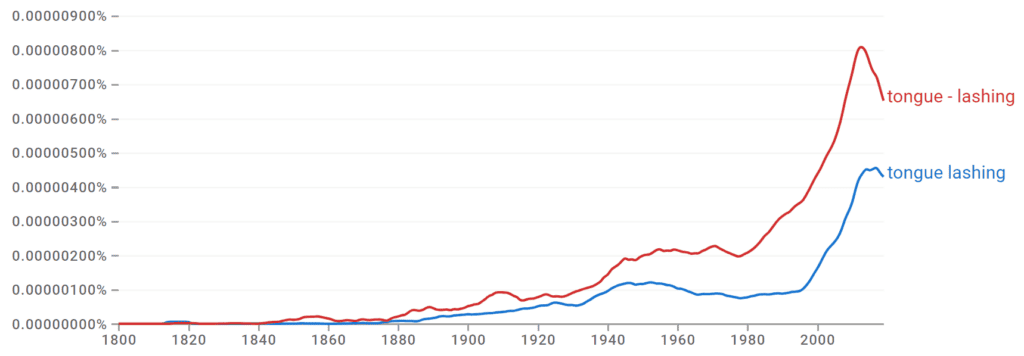Tongue-lashing is a noun referring to a sharp reprimand or scolding. For instance, if your kids said they cleaned their room but didn’t, and you have guests using it, you might give them a tongue-lashing.
Tongue-lashing is an idiom, which is a special kind of phrase in English. Idioms have meanings that aren’t clear from the words themselves, but they help make language interesting. Knowing idioms can help you understand English better and speak it correctly.
This particular idiom became popular in the mid-1800s. While we’re not sure of its exact roots, it’s still commonly used today. Keep reading to learn about its meaning, origin, and how it’s used in a sentence.
What Is a Tongue-Lashing?

A tongue-lashing typically refers to a scolding or a severe verbal reprimand given to someone. It’s when someone uses sharp words to show they’re unhappy with what another person did or said.
When someone gives a tongue-lashing, they speak very firmly. They might be angry, frustrated, or disappointed. The phrase highlights how strong their words are.
Tongue-Lashing in a Sentence
- After arriving home late for the third time, John received a severe tongue-lashing from his disappointed parents.
- The manager gave the employee a tongue-lashing for repeatedly failing to meet deadlines.
- Sarah’s careless mistake cost the company significant money, and she knew she was in for a tongue-lashing from her supervisor.
- After forgetting my sister’s birthday, she gave me a real tongue-lashing.
- The coach gave the team a tongue-lashing for not practicing hard enough.
- I received a tongue-lashing at work today for missing the deadline.
- I overheard the boss’s tongue-lashing and felt glad it wasn’t directed at me.
- Despite the error being minor, she received quite the tongue-lashing.
- Avoiding a tongue-lashing from the coach became the team’s primary motivation.
Is ‘Tongue Lashing’ Hyphenated?
Tongue-lashing is a hyphenated compound word. A hyphenated compound word is composed of two or more words linked by hyphens.
However, the term can also be used as two separate words without a hyphen without changing its meaning.
For example:
- The teacher unleashed a fierce tongue lashing on the students caught cheating on the exam.
Tongue-Lashing Origin

The phrase “tongue-lashing” started being used around the mid-1800s. Here’s a simple breakdown: “tongue” refers to speaking, and “lash” is like hitting. So, around 1857, people began using it to mean being hit with strong words or getting told off.
We’re not exactly sure where the phrase started, but people probably said it for a while before it became popular.
Let’s Review
A tongue-lashing is a reprimand, a session of harsh scolding, or verbal chiding. It is verbal and is angry and emotional. If one receives a tongue-lashing, they have done something bad or extremely disappointing.
Even though the exact origins are unknown, the term appears in the mid-1800s. It was likely popular in speech before it made its way into a documented source and appeared in the mid-1800s as a popular way to describe a disciplinary measure.
Check out some others we covered:
